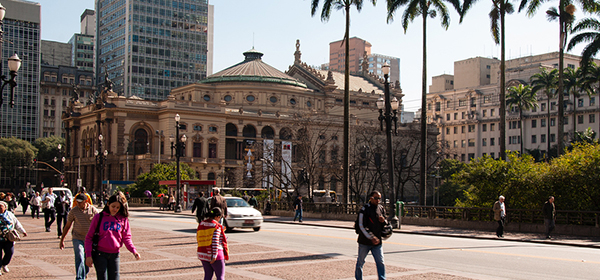Public Transportation in Sao Paulo
Summary: Learning how to get around using public transportation in Sao Paulo is an important step in adjusting to life in Sao Paulo. In this article, we cover the local public transportation options.

Sao Paulo, is a bustling metropolis with a diverse range of public transportation options. The city's public transportation system includes the Metro, the CPTM commuter trains, buses, and taxis. The Metro and CPTM are run by the state government, while the bus system is managed by the city. Taxis are privately operated but regulated by the city. With these options, it's possible for an expat living in Sao Paulo to comfortably live without a car, relying on public transportation and walking. However, the convenience and comfort of these options can vary depending on where you live and work in the city.
Metro
The Sao Paulo Metro is a rapid transit system that serves the city and some of its surrounding suburbs. It's generally considered safe, even at night, and is used by a diverse range of people, including women traveling alone and children going to school. The Metro operates from 4:40 a.m. to midnight on weekdays and Saturdays, and from 5 a.m. to midnight on Sundays and holidays. A single fare costs R$4.40 (about $0.80 USD). The Metro has five lines that cover a significant portion of the city, but there are some areas, particularly in the outer suburbs, that it doesn't reach.
CPTM Commuter Trains
The CPTM (Companhia Paulista de Trens Metropolitanos) operates commuter trains that connect Sao Paulo with its surrounding suburbs. Like the Metro, the CPTM is generally considered safe and is used by a wide range of people. The trains run from 4 a.m. to midnight on weekdays and Saturdays, and from 4 a.m. to 11 p.m. on Sundays and holidays. A single fare also costs R$4.40. The CPTM has seven lines that cover a large area, but the frequency of service can be lower than on the Metro, particularly outside of peak hours.
Buses
Sao Paulo's bus system is extensive, with routes that cover the entire city. However, buses can be crowded, particularly during rush hour, and traffic congestion can make bus travel slow. The buses are generally safe, but there can be occasional incidents of crime, particularly at night. A single bus fare costs R$4.40, and you can transfer between buses for free within three hours. The bus system operates 24 hours a day, but service is less frequent late at night and early in the morning.
Taxis
Taxis in Sao Paulo are plentiful and can be a convenient way to get around, particularly if you're traveling with luggage or in a group. They're generally safe, but it's always a good idea to use a reputable company or call for a taxi rather than hailing one on the street. Taxis operate on a meter, and the fare depends on the distance and time of travel. There's a minimum fare of R$4.50, and the average fare per kilometer is R$2.75. Taxis are available 24 hours a day.
In conclusion, Sao Paulo's public transportation system is diverse and extensive, making it possible for an expat to live in the city without a car. However, the convenience and comfort of the system can vary depending on where you live and work, and traffic congestion can make travel by bus or taxi slow. Despite these challenges, many people in Sao Paulo rely on public transportation for their daily commute and find it a viable alternative to owning a car.
About the Author
 Betsy Burlingame is the Founder and President of Expat Exchange and is one of the Founders of Digital Nomad Exchange. She launched Expat Exchange in 1997 as her Master's thesis project at NYU. Prior to Expat Exchange, Betsy worked at AT&T in International
and Mass Market Marketing. She graduated from Ohio Wesleyan University
with a BA in International Business and German.
Betsy Burlingame is the Founder and President of Expat Exchange and is one of the Founders of Digital Nomad Exchange. She launched Expat Exchange in 1997 as her Master's thesis project at NYU. Prior to Expat Exchange, Betsy worked at AT&T in International
and Mass Market Marketing. She graduated from Ohio Wesleyan University
with a BA in International Business and German.
Some of Betsy's articles include 12 Best Places to Live in Portugal, 7 Best Places to Live in Panama and 12 Things to Know Before Moving to the Dominican Republic. Betsy loves to travel and spend time with her family. Connect with Betsy on LinkedIn.
Additional Information:
- Pros & Cons of Living in Sao Paulo
- Tips for Expats Driving in Sao Paulo
- Cost of Living in Sao Paulo
- Health Care in Sao Paulo
- Discover the Best of Sao Paulo
- 5 Tips For Living in Sao Paulo
- Healthcare & Health Insurance in Brazil
- Best Places to Live in Brazil
- Real Estate in Brazil
- Pros & Cons of Living in Brazil
- Understanding Mental Health in Brazil
- What It's Like Living in Sao Paulo
- Pros and Cons of Living in Brazil 2025



